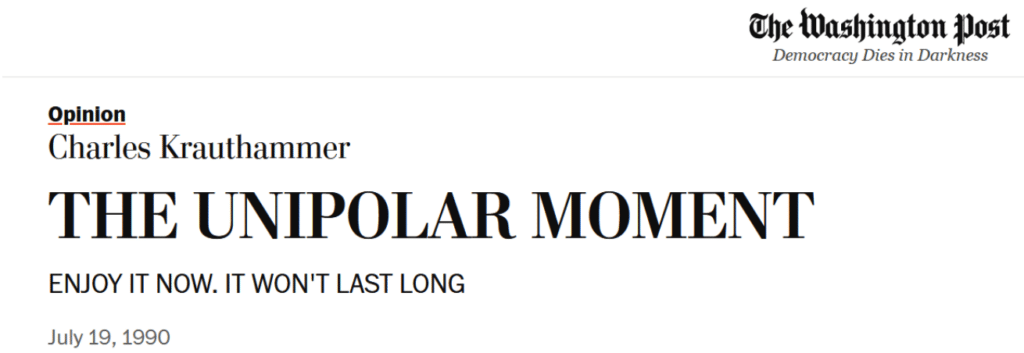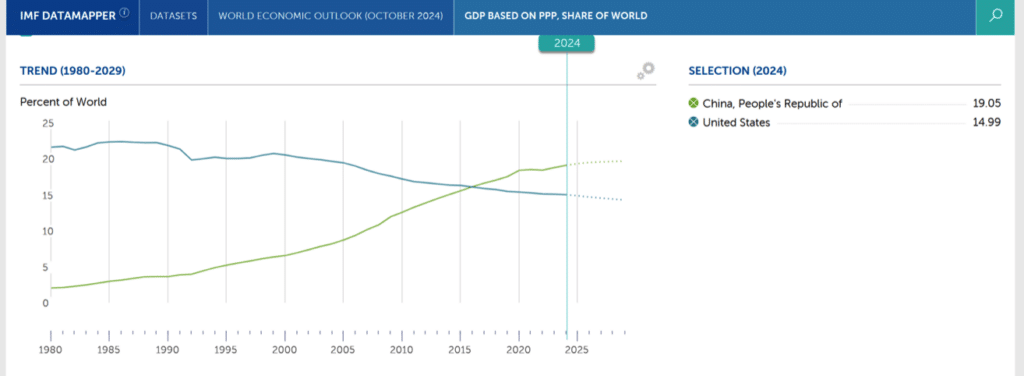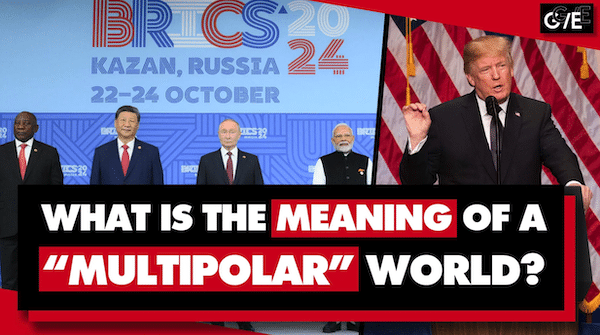It is now widely acknowledged that the world is multipolar. This is so uncontroversial that the Munich Security Conference chose the title “Multipolarization” for its 2025 annual report.
However, there is not a common definition of “multipolarity”. The Munich Security Report noted that, while “the world’s ‘multipolarization’ is a fact”, the “international system shows elements of unipolarity, bipolarity, multipolarity, and nonpolarity”, in which “multiple order models co-exist, compete, or clash”.
Governments have radically different understandings of the meaning of multipolarity.
The definition used by the United States, and especially by the Donald Trump administration, is the opposite of the idea of multipolarity advocated by China.
When China talks about a multipolar world, it means one without imperialism and without hegemony, with “equality among all countries regardless of size”, where all nations have an equal voice in multilateral institutions and can pursue their own independent path of development, without foreign intervention.
“Rivalry between big powers had brought disaster to humanity”, warned China’s Foreign Minister Wang Yi. “Equal rights, equal opportunities and equal rules should become the basic principles of a multipolar world”, he argued, calling for “greater democracy in international relations”.
This is a view shared by many Global South countries. Nicaragua’s President Daniel Ortega, the leader of the Sandinista Revolution, has an anti-imperialist view of multipolarity. He argued that “a new order is being born in the world that buries imperialism, buries the colonialists, and opens the way to a democracy of nations, a multipolarism that is manifesting itself in various ways”, but he cautioned that,
on the other hand, we see North American imperialism trying to maintain its hegemony at all costs, even at the risk of sinking its own economy.
The view in Washington could hardly be more different.
When U.S. Secretary of State Marco Rubio talks about multipolarity, he means that there are now other great powers capable of challenging U.S. dominance.
The conclusion of the Trump administration is that the U.S. must re-assert its imperial “sphere of influence” in the Western hemisphere. This is why Trump is so aggressively threatening Greenland, Canada, Mexico, Panama, and other countries in Latin America.
In other words, China has an anti-imperialist view of a multipolar world, whereas Trump and Rubio believe it means a return to “great power competition” and “inter-imperialist rivalry”.
Beijing sees multipolarity as a desirable step toward international cooperation and development that will encourage peace; Washington sees multipolarity as a threat to its hegemony that will foster further conflict.
From the unipolar moment to “great power competition”
In the 1990s, the world was overwhelmingly dominated by the United States, which could impose its will on most countries. The overthrow of the Soviet Union and its socialist allies meant there was no longer a counterbalance to U.S. hegemony.
Neoconservative pundits like the Washington Post columnist Charles Krauthammer declared this to be “the unipolar moment”. Nevertheless, he warned in 1990:
Enjoy it now. It won’t last long.

When exactly the unipolar moment ended has been hotly debated. Some argue it was the North Atlantic financial crisis of 2007-09. Others say it was the conflict in Ukraine, which started with a U.S.-backed coup in 2014 and escalated into a Russia-NATO proxy war in 2022.
Other important developments include the founding of BRICS in 2009, as well as the rapid economic growth in China, which became the “world’s sole manufacturing superpower” and in 2016 overtook the U.S. as the biggest economy on Earth, when its GDP is measured at purchasing power parity.

It is too simplistic to say U.S. unipolarity ended in one specific moment, but, regardless, by the 2020s, it was no longer debatable that the world was multipolar.
Neoconservative war hawks like Marco Rubio reluctantly recognized this reality, but they saw it as a tragedy–and a threat.
Today, “we do have near-peer adversaries”, Rubio lamented in a Senate Foreign Relations Committee hearing in 2022.
We didn’t 25 years ago; the United States lived in a unipolar world, where we were the only show in town.
“Now, there are at least one unprecedented near-peer adversary”, Rubio said.
The Chinese Communist Party is a challenge to the United States unlike, greater even than what the Soviet Union was, because they are a commercial rival, a technological rival, a geopolitical rival, a diplomatic rival, and an economic and commercial one. And in addition to all of that, they are also a military threat to the country, as they continue to develop.
The U.S. Department of Defense dubbed this “great power competition”. The Pentagon warned in 2019 that the “United States enjoys a lead there now, but other nations are nipping at its heels”.
China says “equal rights, equal opportunities and equal rules should become the basic principles of a multipolar world”
China has criticized Washington’s rhetoric about “competition”. Instead, Beijing has promoted what it calls “mutual benefit and win-win cooperation”.
At an event in 2023, China’s ambassador to the United States, Xie Feng, emphasized,
President Xi Jinping has proposed the three principles of mutual respect, peaceful co-existence and win-win cooperation.
China has made it clear that it does not want to create an empire, and it is not seeking to replace U.S. hegemony with Chinese hegemony.
When China talks about multipolarity, its means a world without imperialism and without hegemony.
This is a definition that is shared by many countries in the Global South, and in BRICS in particular.
China’s Foreign Minister Wang Yi articulated his nation’s view of multipolarity in a speech at the Munich Security Conference in February 2025.
The world is “headed toward multipolarization”, Wang said. “When the United Nations was founded 80 years ago, it had only 51 member states; today, 193 countries ride in the same big boat”.
“A multipolar world is not only a historical inevitability; it is also becoming a reality”, argued the Chinese foreign minister.
Nevertheless, Wang insisted that multipolarity should not “bring chaos, conflict and confrontation”, and it must not “mean domination by major countries and the strong bullying the weak”.
“China’s answer is, we should work for an equal and orderly multipolar world”, Wang said.
In China’s view, multipolarity should have four characteristics:
- “equal treatment” for all countries;
- respect for international law;
- multilateralism, centered in the United Nations;
- “openness and mutual benefit”.
The Chinese foreign minister explained (emphasis added):
Rivalry between big powers had brought disaster to humanity, as evidenced by the lessons of the two world wars in the not-so-distant past. Whether it is the colonial system or the core-periphery structure, unequal orders are bound to meet their demise. Independence and autonomy is sought across the world, and greater democracy in international relations is unstoppable. Equal rights, equal opportunities and equal rules should become the basic principles of a multipolar world.
It is in this principle that China advocates equality among all countries regardless of size, and calls for increasing the representation and say of developing countries in the international system. This will not lead to “Westlessness,” but will deliver more positive-sum results to the world. … Every country should have their voice heard. Every country should be able to find their place and play their role in a multipolar paradigm.
China’s understanding of multipolarity is the opposite of that promoted by the United States.
Returning to colonial Monroe Doctrine, Trump administration sees Western hemisphere as U.S. imperial “sphere of influence”
Marco Rubio’s acknowledgment that the world is multipolar is by no means a sign that the United States is abandoning its imperialist ambitions. On the contrary.
The Trump administration has made it clear that it sees the Western hemisphere as part of the U.S. imperial “sphere of influence”, and it wants to forcibly impose U.S. hegemony and minimize Chinese influence in the region.
This is why Trump has vowed to colonize Greenland, despite the fact that 85% of Greenlanders do not want to be part of the United States, and just 6% do.
It is why Trump has repeatedly floated the idea of turning Canada into the “51st state”.
It is why Trump has been especially aggressive in Latin America, pledging to colonize the Panama Canal, deliberating plans to invade Mexico, attacking Colombia, and threatening Venezuela, Nicaragua, and Cuba.
In his inauguration speech, Trump invoked the colonialist idea of “Manifest Destiny”, and he promised to “expand our territory”.
At an event on January 25, the U.S. president told supporters he wants a “very substantially enlarged country”:
We may be a very substantially enlarged country in the not too distant [future]—isn’t it nice to see?
You know, for years, for decades, we’re the same size to the square foot–probably got smaller, actually–but we might be an enlarged country pretty soon.
Trump allies have frequently invoked the 202-year-old Monroe Doctrine, which treats Latin America as the colonial “backyard” of the U.S. empire. They have threatened Latin American leaders and told them to cut ties with China and Russia.
Rubio’s first foreign trip as U.S. secretary of state was to Panama, where he successfully pressured the Central American nation to withdraw from China’s global infrastructure project, the Belt and Road Initiative.
The Associated Press summarized Rubio’s message to Panama:
Immediately reduce what President Donald Trump says is Chinese influence over the Panama Canal area or face potential retaliation from the United States.
Rubio subsequently traveled to El Salvador, Costa Rica, Guatemala, and the Dominican Republic, where his threat was the same: minimize your relations with China, or else the U.S. empire will attack you.
Marco Rubio sees China as main “threat” to U.S. empire
Marco Rubio did his first interview as U.S. secretary of state in January, with the conservative talk show host Megyn Kelly.
Some Trump supporters pointed to Rubio’s remarks to claim that he has supposedly moved away from his warmongering neoconservative past, and has instead become a foreign-policy “realist”. But they took his comments out of context.
In the interview, Rubio stated:
It’s not normal for the world to simply have a unipolar power… That was an anomaly. It was the product of the end of the Cold War. But eventually you were going to reach back to a point where you had a multipolar world, [with] multi great powers in different parts of the planet.
We face that now with China, and to some extent Russia, and then you have rogue states like Iran and North Korea you have to deal with.
In context, what these remarks demonstrated is that Rubio’s definition of multipolarity is totally different from that of China. The secretary of state sees the U.S. empire as in a “great power competition” with China and Russia.
In fact, Rubio spent much of his interview with Megyn Kelly fearmongering about China. He mentioned the words “China” or “Chinese” 65 times in roughly one hour.
Rubio framed his foreign-policy strategy as an all-encompassing attempt to weaken China.
“China wants to be the most powerful country in the world and they want to do so at our expense, and that’s not in our national interest, and we’re going to address it”, Rubio declared.
The secretary of state falsely claimed that China controls the Panama Canal, echoing the rhetoric of Trump, who falsely stated in his inauguration speech, “China is operating the canal” and “we’re taking it back”.
When asked why the Trump administration is targeting Greenland, Rubio said it is to counter China and to prevent Beijing from having influence in the Arctic region. His answer, according to the official State Department transcript, follows (emphasis added):
Well, the Arctic, which has gotten very little attention, but the Arctic Circle and the Arctic region is going to become critical for shipping lanes, for how you get some of this energy that’s going to be produced under President Trump—these energies rely on shipping lanes. The Arctic has some of the most valuable shipping lanes in the world. As some of the ice is melting, it’s become more and more navigable. We need to be able to defend that.
So if you project what the Chinese have done, it is just a matter of time before—because they are not an Arctic power. They do not have an Arctic presence, so they need to be able to have somewhere that they can stage from. And it is completely realistic to believe that the Chinese will eventually—maybe even in the short term—try to do in Greenland what they have done at the Panama Canal and in other places, and that is install facilities that give them access to the Arctic with the cover of a Chinese company but that in reality serve a dual purpose: that in a moment of conflict, they could send naval vessels to that facility and operate from there. And that is completely unacceptable to the national security of the world and to the United—to the security of the world and the national security of the United States.
So the question becomes: If the Chinese begin to threaten Greenland, do we really trust that that is not a place where those deals are going to be made? Do we really trust that that is not a place where they would not intervene, maybe by force?
In short, the Trump administration says it must colonize the Panama Canal, Greenland, and other foreign lands because of hypothetical threats that they imagine China could pose one day.

